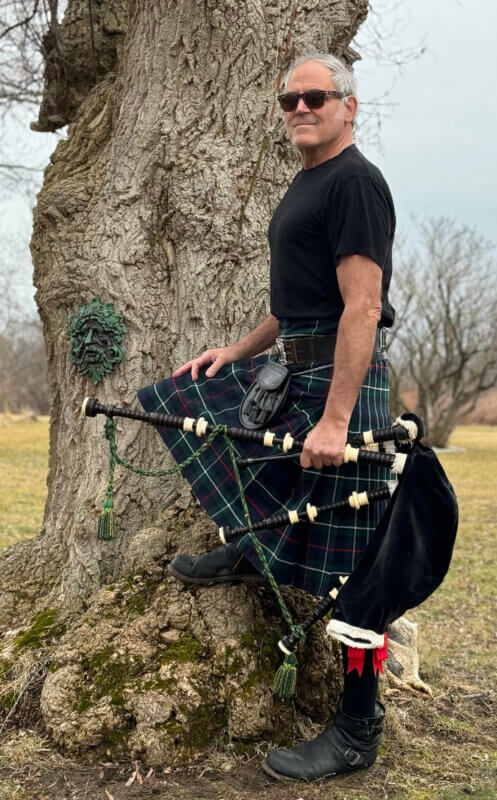Douglas Webster practices and encourages creativity
Douglas Webster doesn’t want his musical pursuits to be confined to one genre.
The founder of the bagpipe group Drumduan and the Celtic Company has recently begun singing opera and hopes to combine that with his love of Celtic music and rock guitar.
When Webster was 11 years old, his parents suggested he learn a musical instrument, and he chose French horn. Later, he began taking bagpipe lessons. At 30, he joined the St. Andrews Society Pipe Band and played with them for roughly eight years.
Webster has traveled far with his bagpipe, performing at a wedding in New York City and another at the top of Sugarbush; he wore a tuxedo for the former and skis for the latter.

Feeling that a bagpipe band seemed somewhat militaristic, Webster opted for a different approach to music and began to choreograph dance with his then partner, Heather Morris, who was a Highland dance instructor.
In 2014, Webster and Morris founded the Celtic Company which played at events across the state and beyond. They were invited to tour Europe, but their day jobs interfered. Webster also plays in a band called Drumduan, named after the Scottish estate his father’s family is from. They play a variety of Scottish and Cape Breton tunes.
In addition to bagpipes, Webster plays guitar and low D penny whistle, and he has recently begun singing opera.
“My goal, “he said, “is to integrate opera, Celtic music and rock. I have no idea what it will sound like, but I can picture it in my mind.”
Ideally, Webster would like to combine his musical pursuits with his philosophy of RAD – reduce, adapt and drawdown. His master’s thesis at St. Michael’s College was on corporate social responsibility involving greenhouse gases and toxic substance release and he has not wavered from his commitment to those goals. He has a background in aerospace engineering and was recruited by BF Goodrich Aerospace, now Collins Aerospace, to develop the F22 and F35 cockpits.
Webster is proud of being the founder and producer of the Champlain Maker Faire, an annual event celebrating invention, creativity, curiosity and hands-on learning which was last held in 2019 before being shuttered by COVID. He recalls parents approaching him and telling him that this was how education should be done. At the Champlain Maker Faire, Webster introduced drone races and started a drone club. He also started a Champ-bot contest to make robotic lake monsters and got his leg hair singed when he walked too close to one as the operator pushed a button to make flames come out.
Webster used his Champlain Maker Faire connections to take part in several local and national initiatives. He produced two television series on innovation and became the president of the National Association for Workforce Improvement.
“The goal was always more than the event,” he said. “It was to build networks and bring people who didn’t know each other together.”
Webster’s aim has always been to create new businesses, promote better economic development, particularly in clean energy, and to have an influence on reducing greenhouse gases. He would also like to see more teachers and students have what he describes as a “maker mindset” and pursue studies that will help bring about solutions to the climate crisis.
Professionally, Webster is entering his fourth decade with the Vermont Agency of Education, working primarily in career and technical education.
“When I came on board, I saw a system that had been developed in the 1960s and hadn’t really changed,” he said.
Webster said he was able to redesign career and technical education, both locally and nationally. One of those innovations was the implementation of industry-recognized credentials.
“It’s important for students to get some recognition for the work they’ve done while they’re in school,” Webster said.

